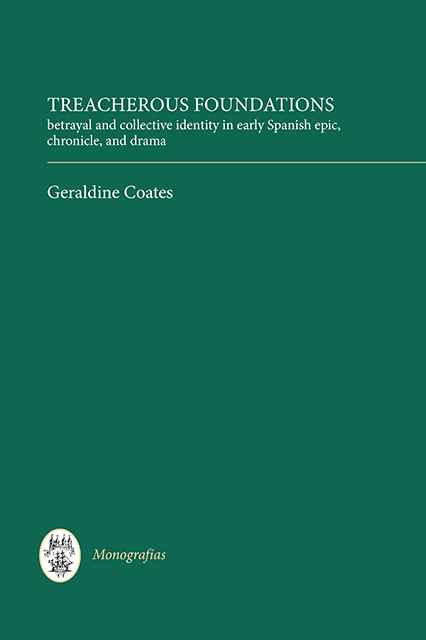 Treacherous Foundations
Treacherous Foundations Book contents
- Frontmatter
- Contents
- Dedication
- Acknowledgements
- Abbreviations
- 1 Introduction
- 2 Trauma and Triumph in the Poema de Fernán González
- 3 ‘Et si desto menguas’: Imperial Decline in the Estoria de España
- 4 ¿Traición tan provada? Treachery Refashioned in Juan de la Cueva
- 5 The Historical Vision of Lope de Vega: Castile and Castidad
- 6 Conclusion
- Works Cited
- Index
3 - ‘Et si desto menguas’: Imperial Decline in the Estoria de España
Published online by Cambridge University Press: 07 March 2023
- Frontmatter
- Contents
- Dedication
- Acknowledgements
- Abbreviations
- 1 Introduction
- 2 Trauma and Triumph in the Poema de Fernán González
- 3 ‘Et si desto menguas’: Imperial Decline in the Estoria de España
- 4 ¿Traición tan provada? Treachery Refashioned in Juan de la Cueva
- 5 The Historical Vision of Lope de Vega: Castile and Castidad
- 6 Conclusion
- Works Cited
- Index
Summary
Princeps inuictus, princeps semper venerandus, Qui meritis laudes superat, qui uindice fraudes
(Alfonso el Sabio 1955: 2)Guardar, Crecer, Minguar
The connection between father and son is at the foundations of the Estoria de España (1252-84). One of the final chapters of the chronicle describes the words of King Ferdinand, on his deathbed in 1252, to his eldest son Alfonso X, outlining the responsibilities and objectives awaiting the new King of Castile and Leon:
fijo, rico fincas de tierra et de muchos buenos vasallos, mas que rey que en la cristiandat sea; punna en fazer bien et ser bueno, ca bien as con que [. . .] Ssennor te dexo de toda la tierra de la mar aca, que los moros del rey Rodrigo de Espanna ganado ouieron; et en tu sennorio finca toda: la una conquerida, la otra tributada. Sy la en este estado en que te la yo dexo la sopieres guardar, eres tan buen rey commo yo; et sy ganares por ti mas, eres meior que yo; et si desto menguas, non eres tan bueno commo yo. (Alfonso el Sabio 1955: 772)
Speaking of a legacy of land and men unrivalled throughout Christendom, he presented a ternary structure of possibility for the future king; if the kingdom remained in this state Alfonso would be as good a king as his father, if it were to expand he would be a greater king, and if it were to diminish he would be a lesser one. This part of the Estoria, which treats the reign of Ferdinand III, may not belong to the portion of the chronicle written during the reign of Alfonso X. Even so, this aetiology of political success or failure— guardar, crecer, minguar — provides a means by which Alfonso’s reign can be judged against that of his predecessors and gives a useful summary of the priorities he was to adopt on taking to the throne.
Alfonso’s historiographical project can be introduced within the broader context of European historiography in the twelfth and thirteenth centuries, where chronicles were being used in the service of political and cultural programmes. In response to the tensions between the kingdoms of Castile and Leon, Lucas de Tuy in his Chronicon mundi promoted a Hispanic, Leonese context: ‘une sorte d’hispanisation du monde chrétien’ imbued with ‘l’idée d’une patria, tantôt léonaise, tantôt hispanique, toujours chrétienne’ (Henriet 2001: 261, 256).
- Type
- Chapter
- Information
- Treacherous FoundationsBetrayal and Collective Identity in Early Spanish Epic, Chronicle, and Drama, pp. 76 - 112Publisher: Boydell & BrewerPrint publication year: 2009


